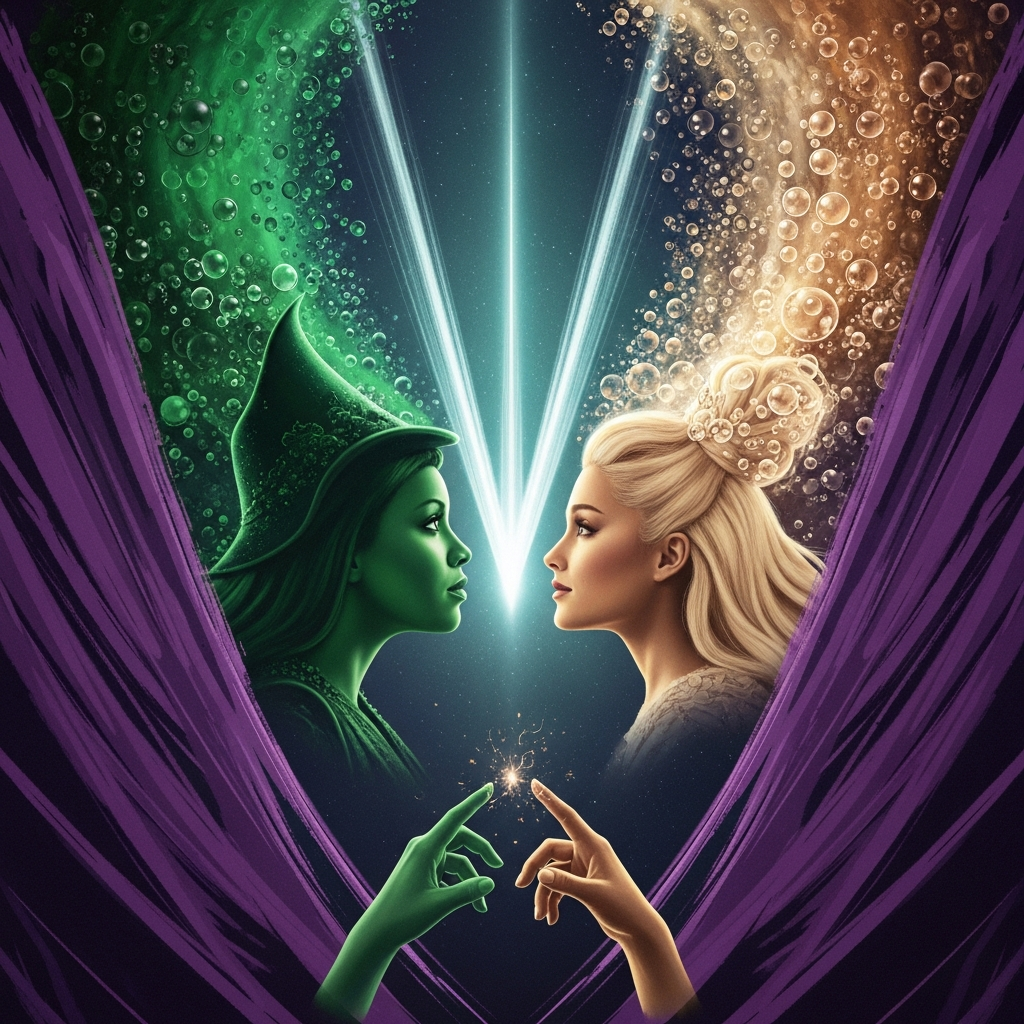Jon M. Chu’s ambitious two-part cinematic adaptation of Wicked culminates triumphantly with Wicked: For Good, delivering a powerful and deeply resonant finale that is earning widespread critical acclaim. This highly anticipated second installment, starring Cynthia Erivo as the misunderstood Elphaba and Ariana Grande as the evolving Glinda, exceeds expectations, offering a more intimate and emotionally complex journey that has critics and audiences alike proclaiming it superior to its predecessor. While Erivo remains a formidable presence with her unparalleled vocal talent, Grande’s portrayal of Glinda truly dazzles, guiding the narrative with newfound depth and nuance. Prepare for an unforgettable return to Oz, where sisterhood, self-discovery, and the fight against injustice take center stage in a visually stunning and musically rich spectacle.
The Dazzling Dual Performances of Erivo and Grande
The casting of Cynthia Erivo and Ariana Grande as the iconic duo was lauded as a masterstroke from the outset, a sentiment only reinforced by Wicked: For Good. Erivo, reprising her role as Elphaba, continues to be an absolute powerhouse. Her vocal pipes, often described as shaking the heavens, are matched by an unyielding wellspring of emotional intensity. Erivo’s Elphaba is genuinely moving, convincingly portraying the inherent kindness and fairness of a character unfairly branded the Wicked Witch of the West. She effortlessly conveys Elphaba’s opposition to cruel injustices, anchoring the film with her compelling and deeply felt performance.
Yet, it is Ariana Grande’s Glinda who truly comes into her own in this second chapter. Critics universally praise Grande for infusing the character with tender depths and a captivating journey of self-realization. She transforms Glinda from a “conceited blonde bubblehead” into a figure of statesmanlike responsibility, her vanity deflated by crushing romantic disappointment and a growing loyalty to Elphaba. Grande’s quiet moments of introspection, anxiety, and sadness reveal a nuanced performance that humanizes and enriches the character, elevating the entire movie experience. This thematic shift, foregrounding Glinda’s evolution, creates a lovely symmetry with the first film, which predominantly belonged to Elphaba.
Glinda’s Poignant Evolution and New Melodies
Wicked: For Good meticulously charts Glinda’s growth, portraying her unexpected ascent into leadership. Her journey involves navigating manipulative forces and confronting personal shortcomings, all while strengthening her bond with Elphaba. This emotional arc is profoundly explored through “The Girl in the Bubble,” one of two new songs penned by Stephen Schwartz for the film. Grande’s heartfelt delivery of this song provides intimate access to Glinda’s personal crisis, as she honestly assesses her priorities and privilege. This pivotal moment solidifies her moral compass, demonstrating Glinda’s burgeoning understanding of magic and the world around her, effectively leveling the playing field between the traditionally complex Elphaba and the once-perky Glinda.
Elphaba’s Resolute Stand and Oz’s Shifting Power
As Glinda finds her footing, Elphaba’s vilification intensifies across Oz. Banners depicting her as a monster fuel a narrative of fear and hatred, skillfully orchestrated by Madame Morrible (Michelle Yeoh) through a blend of witchcraft and calculated propaganda. This demonization of otherness, chillingly parallel to contemporary political landscapes, sees animals — once respected members of Oz society — reduced to forced laborers on the Yellow Brick Road. Elphaba, now an outcast, courageously emerges from her hiding place to defend these mistreated creatures, demonstrating her unbreakable backbone and unwavering commitment to justice.
Unmasking the True Villains and New Connections
The narrative cleverly redefines villainy, establishing Madame Morrible as the true despotic power player behind the curtain. Michelle Yeoh sinks her teeth into Morrible’s manipulative shadow villainy, portraying a formidable antagonist whose ruthlessness far surpasses the “empty-vessel” Wizard (Jeff Goldblum), who remains a self-serving but charming charlatan. During a forest interlude, Elphaba encounters animals fleeing to the mysterious “place beyond Oz.” She dissuades them with another new song, “No Place Like Home,” delivered with inspirational fervor by Erivo. This sequence also introduces the origins of the Cowardly Lion (voiced by Colman Domingo), one of the beloved sidekicks from The Wizard of Oz. The screenplay, by Winnie Holzman and Dana Fox, masterfully intertwines these elements with L. Frank Baum’s novel, offering subtle glimpses of Dorothy and Toto without fully revealing them.
Visual Spectacle and Musical Resonance
Visually, Wicked: For Good is a feast for the eyes, maintaining the high standards set by its predecessor. Nathan Crowley’s spectacular production design and Paul Tazewell’s wildly imaginative costumes create a vibrant, infinite rainbow of colors captured by Alice Brooks’ stunning cinematography. The film’s lush orchestrations of Stephen Schwartz’s timeless tunes provide expansive aural dimensions that perfectly complement the dazzling visuals. While some critics note the occasional overuse of the camera whirling around characters during songs or Chu’s tendency to overstuff the frame with busy choreography, these elements are largely forgivable, contributing to the dizzying, immersive effect beloved by ardent fans. The superb underscoring skillfully weaves musical themes from the first film, enhancing the emotional depth and continuity of the story.
Crafting a Cinematic Finale: The Power of Sisterhood
The film’s central theme of mutually nourishing sisterhood between Glinda and Elphaba reaches its emotional zenith. The moving performance of the title song “For Good” by Erivo and Grande, celebrating reciprocal love and support, brought audiences at press screenings to tears. Director Jon M. Chu approached this two-part adaptation with fearlessness, trusting his instincts to stretch the story’s boundaries. Screenwriter Dana Fox collaborated closely with Holzman and Schwartz, delving into intricate world-building details, such as the nature of Elphaba’s magic, to enrich the cinematic experience beyond the stage show. This meticulous approach allowed the filmmakers to delve deeper into character choices and consequences, resulting in a more focused and human story. The love triangle involving Glinda, Elphaba, and Fiyero (Jonathan Bailey) also acquires resonant dimensions, with Bailey bringing new gravitas and honor to his role. (Notably, Jonathan Bailey was recently honored as People magazine’s Sexiest Man Alive for 2025, marking a significant and celebrated milestone).
Critical Acclaim and Audience Connection
Wicked: For Good has garnered overwhelmingly positive reviews, with many critics declaring it “better and more emotionally resonant” than the first film. It currently boasts strong audience and critical scores, achieving a 97 percent audience score and 71 percent critics score on Rotten Tomatoes. Director Jon M. Chu is widely praised for “sticking the landing,” delivering a sensational spectacular that improves upon the stage show’s second act. Critics note the film’s elevated stakes, deeper character development, and masterful direction of incredible sequences.
Reviewers highlight the film’s “sincerity, heart, and belief in a better world,” crediting Grande and Erivo for flawlessly conveying this inspiring message. While Wicked: For Good may not feature a blockbuster song on par with “Defying Gravity,” it compensates through its powerful performances, Stephen Schwartz’s musical genius, and a narrative that brings the Wicked cycle to a “surprisingly satisfying conclusion.” The film’s intentional shift towards “old-school intimacy” in its musical numbers, focusing on the stars as “more balladeers than belters,” prevents it from feeling like a rehash, making it “more somber, more focused, more human.” This comprehensive and impactful continuation is set to enchant theaters, providing a magical experience for both devoted fans and new audiences alike.
Frequently Asked Questions
What are the key thematic differences between the two Wicked films?
While the first Wicked film established the unlikely friendship and Elphaba’s origin story, Wicked: For Good shifts its focus significantly to Glinda’s journey and transformation. The sequel explores Glinda’s evolution from a superficial student to a figure of leadership and moral responsibility, delving into her personal growth, romantic disappointments, and burgeoning understanding of magic. It also intensifies the themes of political propaganda and the demonization of “otherness” through Madame Morrible’s manipulative tactics, contrasting sharply with Elphaba’s unwavering fight for justice. Director Jon M. Chu described the first film as a fairy tale, while “In movie two, all bets are off. The fairy tale is shattered,” indicating a deeper, more complex narrative.
Which new songs feature in Wicked: For Good, and what is their significance?
Wicked: For Good introduces two new original songs penned by Stephen Schwartz, co-composing with John Powell. The first, “No Place Like Home,” is sung by Elphaba (Cynthia Erivo) during a forest interlude where she attempts to dissuade animals from fleeing Oz. This song underscores Elphaba’s compassionate nature and her deep connection to the land and its creatures. The second new song, “The Girl in the Bubble,” is performed by Glinda (Ariana Grande). This number is particularly significant as it provides intimate access to Glinda’s internal struggles during a moment of personal crisis, helping her to re-evaluate her priorities and establish her moral compass, ultimately humanizing her character and enriching her arc throughout the film.
How has Wicked: For Good been received by critics and audiences compared to the first film?
Wicked: For Good has been met with largely positive reception, with many critics and audiences considering it superior to the first installment. It earned strong scores, including a 97% audience score and a 71% critics score on Rotten Tomatoes. Reviewers consistently praise the film for being “better and more emotionally resonant,” highlighting director Jon M. Chu’s success in “sticking the landing” for the two-part adaptation. While the first film garnered 10 Oscar nominations and two wins, the sequel is celebrated for its elevated stakes, deeper character development, and the standout performances, particularly from Ariana Grande, which many believe warrants Oscar buzz. The overall consensus points to a satisfying and impactful conclusion to the Wicked saga.


